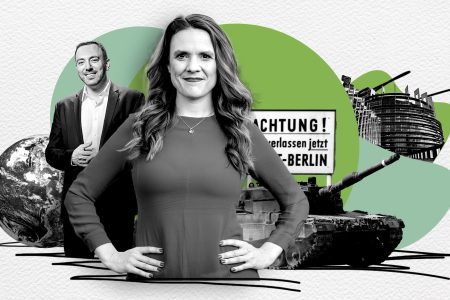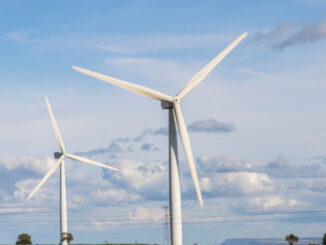
In a push to counter an expected drop in seats in the new European Parliament, the Greens are banking on extending their demographic and geographical base, their lead candidate Terry Reintke told Euractiv.
The green tide that helped the Greens become the fourth-largest group in the European Parliament in 2019 seems to have dried up – but the party is not giving up.
While Europe Elects’ projections for the Greens hit rock bottom in late April with 48 seats, compared to 74 won in 2019, the Greens are now polling at 56.
According to Reintke, co-lead candidate of the European Greens, this recovery reflects their successful campaign mobilisation, giving hope they can repeat the unprecedented “green wave” of 2019.
“In 2019, civil society, from the youngest to the oldest, mobilised heavily, our voters went to the polling stations, and in the end, we increased our seats [from those projected].”
Before the 2019 elections, polls were giving the Greens between 50 and 60 seats, and they ended up with 74.
This time around, with the threat of losing influence compounded by the expected surge of the far-right, the Greens have focused on mobilising their young voters and attracting new ones.
New regions
Above all, Reintke pointed to efforts to conquer territories where the Greens have not been well-represented.
“Over the past five years, we have welcomed many new member parties from Southern and Eastern Europe,” she said. “[We] hope this will now pay off in this election.”
While Eastern and Southern Europeans account for half of the EU’s population, they make up less than a fifth of Green lawmakers. By comparison, nearly 60% of centre-right EPP lawmakers come from those regions.
Reintke pointed out that some of the Greens’ traditional topics have coincided with the most pressing issues in election campaigns in Eastern Europe.
“In Eastern Europe, the fight against corruption and for the rule of law and democracy is the most important – especially regarding the Russian aggression”.
However, the 11 new green parties from the south and east of Europe that joined in the last five years will have little impact on the overall result, with just around five extra seats expected from Latvia, Croatia, Spain, and Lithuania.
New messages
Meanwhile, in its Western European heartland, the party is still more successful among people with higher incomes. Nowhere does this show more than in Reintke’s native Germany.
In the last national election, the Greens were the third-strongest party in the regions of the former West Germany that remain economically stronger, while coming last in the east of the country.
Following controversies around allegedly costly green policies in Germany, Reintke wants the Greens “to concentrate more strongly” on linking climate protection to economic justice to broaden their appeal. She gave as an example the idea to introduce a “European climate grant” for citizens to offset higher carbon emission prices.
The situation on the ground outside the Greens’ heartland remains challenging, however, as they must tackle entrenched power structures and prejudices against the party.
This is a common experience for Sergey Lagodinsky, Reintke’s co-lead candidate in Germany, who leads the campaign in Brandenburg, the centre of the former East.
Lagodinsky came to Germany as a teenage refugee from the former Soviet Union. As an Eastern European specialising in foreign policy, he believes in the Greens’ new focus on geopolitics as a remedy, which manifests most strongly in their support for Ukraine, military cooperation, and NATO, as laid down in the Greens’ manifesto.
“Our geopolitical orientation and value-led foreign policy definitely work in Eastern Europe,” he told Euractiv on the sidelines of a campaign event in Potsdam, Brandenburg.
But competition looms large as the niche of security policy has long been occupied by parties such as the hard-right PiS in Poland, he said.
“Overall, I notice there is still room for improvement in terms of connecting with the centre of society in Eastern Europe,” Lagodinsky admitted, adding that the same applies to some parts of Eastern Germany.
In Germany’s east, the far-right AfD came second in the national election while the Greens are not always welcome, with some suffering physical attacks during the campaign.
But Lagodinsky believes he can at least counter hostile attitudes towards Greens by seeking personal contact with people during the campaign.
Doubling-down on youth
The Greens have also not forgotten about their key target group that in part led the 2019 ‘Green wave’.
They have doubled down efforts to reach over 20 million first-time voters, Gen Z, and millennials, with a strong social media campaign and over 3,000 digital volunteers and influencers to help spread the party’s message, Greens’ campaign manager Sybren Kooistra told Euractiv.
They have also created eye-catching websites such as the ‘Russia Roulette,’ where they highlight Russian influence controversies of far-right parties such as Marine Le Pen’s Rassemblement national, Austria’s FPÖ, and Germany’s AfD.
“The main theme of the campaign is the flirting with the far-right by liberals and conservatives. Not migration, not austerity, not competition,” Kooistra said.




